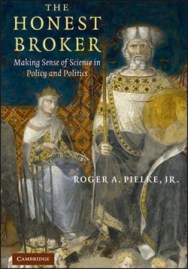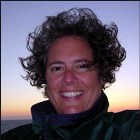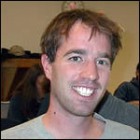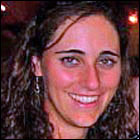Center News
The Honest Broker Receives Rave Reviews
 Roger Pielke, Jr.’s latest book, The Honest Broker: Making Sense of Science in Policy and Politics was reviewed in Bioscience this past April by Robert Lackey, a scientist at EPA. Lackey provides a strongly positive review including the following:
Roger Pielke, Jr.’s latest book, The Honest Broker: Making Sense of Science in Policy and Politics was reviewed in Bioscience this past April by Robert Lackey, a scientist at EPA. Lackey provides a strongly positive review including the following:
The Honest Broker is a must-read for any scientist with even a modest interest in environmental policy or politics, and I recommend it especially to scientists unfamiliar with the continuing controversy over how scientists misuse science in environmental policy and politics. . . . In summary, The Honest Broker is an important book, and it should be read by everyone… (read more).
Mark Shafer, director of climate services at the Oklahoma Climatological Survey, reviewed The Honest Broker in the May, 2008 Bulletin of the American Meteorological Society. He writes:
Pielke's discussion of climate change politics is excellent. He seizes on the central issue in climate change politics: that those opposed to action (based on value decisions) raise scientific uncertainty as a reason for delay or inaction. In response, scientists focus on reducing or eliminating uncertainty to undermine grounds for opposition to action rather than focusing on the merits of the argument, which is really a values-based decision irrespective of the science.
The conclusion to the review is very positive:
The basic framework of the book and its discussion of the importance of considering values and uncertainty are strong. The numerous examples he offers are instructive. Anyone engaged in policy, even on the periphery, would benefit from this discussion.
The Honest Broker can be ordered from Cambridge Press.
Spring 2008 Noontime Seminar Series
 The Center’s popular Noontime Seminar Series wrapped up another successful semester with the following presentations this past spring:
The Center’s popular Noontime Seminar Series wrapped up another successful semester with the following presentations this past spring:
Thomas Chase, To What Degree are Climate Models Useful in Guiding Policy Decisions?, February 4, 2008.
Balaji Rajagopalan, The Once and Future Pulse of Indian Monsoonal Climate, February 18, 2008.
Kathleen Tierney, The Good ,the Bad and the Ugly: Post-Katrina Trends in Hazards Policy and Research, March 17, 2008.
Joe Ryan, Abandoned Mine Cleanups, the Clean Water Act, and Environmental Good Samaritans, March 31, 2008.
Rebecca Morss, Interactions among Flood Predictions, Decisions, and Outcomes, April 7, 2008.
Eva Lövbrand, The Democracy Paradox in Studies of Science and Society, April 9, 2008.
Paul Komor, New energy education programs at CU: What does it mean to teach 'energy'?, April 14, 2008.
Reiner Grundmann, Path dependency in the cases of ozone layer protection and climate change, April 23, 2008.
Elizabeth McNie, Exploring the Agora: Co-producing useful Climate Science for Policy, April 25, 2008.
Andrea Ray, Lessons learned from the 2000s Western drought: Evolving linkages between research and services, April 28, 2008.
William Travis, Sustainability Questioned: Appraising the Viability of Land Use Systems, June 19, 2008.
For more information about these or upcoming talks, or to be added to the email list to receive announcements of talks, visit our Speakers page.
Upcoming Events
Roger Pielke, Jr., is the vice chair for the Gordon Research Conference on Science and Technology Policy “Prospects for Governing Emerging Technologies,” Big Sky, MT. August 17-22, 2008.
Benjamin Hale, Restoration and Remediation as Redress to Wrongdoing, Clemson University, September 5-7, 2008.
Roger Pielke, Jr., Scientists in Highly Politicized Debates, Cornell University, October 23, 2008.
The following speakers (with tentative titles of their talks) will participate in our fall 2008 noontime seminar series. Please check our home page and speakers’ page for final titles, abstracts, and dates of these talks. Better yet, sign up to be on our mailing list and receive email notifications of upcoming talks. All talks are at noon.
September 15, 2008
Barbara Farhar, “Zero Energy Homes”
October 13, 2008
Frank Laird, “Changing Technological Systems: Comprehensive Policy for Renewable Energy”
October 27, 2008
Marilyn Averill, “Climate Litigation: The Role of the Judiciary in U.S. Climate Policy”
November 10, 2008
Jerry Peterson, “A nuclear physicist in the Department of State”
All talks are free and open to the public and will be held at the Center for Science and Technology Policy Research's conference room located at 1333 Grandview Avenue in Boulder. Click here for directions.
Grad Student and Alumni Report
 ENVS and CSTPR graduate student Elizabeth (“Bets”) McNie accepted a joint appointment at Purdue University as an Assistant Professor of Political Science & Earth and Atmospheric Sciences, and will be affiliated with the Purdue Climate Change Research Center. Her areas of interest include environmental and climate policy; science and technology policy; adaptation to climate change; the role of boundary organizations in linking science and policy; and the process of co-producing useful science information for policy through engagement between scientists and civil society. She will continue to explore such issues in the context of the National Oceanic and Atmospheric Administration’s "Regional Integrated Sciences and Applications" program that is dedicated to providing policy-relevant climate science to a range of public and private natural resources, public health, agricultural, and other decision makers. This research will be a continuation of her dissertation, titled: “Co-producing useful climate science for policy: Lessons from the RISA program”. Elizabeth is also interested in the role of climate science in U.S. state climate change adaptation plans; sustainability science; marine transportation in the Arctic; and interdisciplinary research and teaching. Next fall she will teach two courses, an upper division course called, “Global Green Politics” and a graduate level course called “Environmental Politics and Policy”. She will also teach courses in climate change science and policy, sustainability science and policy, policy analysis, science and technology policy, and others.
ENVS and CSTPR graduate student Elizabeth (“Bets”) McNie accepted a joint appointment at Purdue University as an Assistant Professor of Political Science & Earth and Atmospheric Sciences, and will be affiliated with the Purdue Climate Change Research Center. Her areas of interest include environmental and climate policy; science and technology policy; adaptation to climate change; the role of boundary organizations in linking science and policy; and the process of co-producing useful science information for policy through engagement between scientists and civil society. She will continue to explore such issues in the context of the National Oceanic and Atmospheric Administration’s "Regional Integrated Sciences and Applications" program that is dedicated to providing policy-relevant climate science to a range of public and private natural resources, public health, agricultural, and other decision makers. This research will be a continuation of her dissertation, titled: “Co-producing useful climate science for policy: Lessons from the RISA program”. Elizabeth is also interested in the role of climate science in U.S. state climate change adaptation plans; sustainability science; marine transportation in the Arctic; and interdisciplinary research and teaching. Next fall she will teach two courses, an upper division course called, “Global Green Politics” and a graduate level course called “Environmental Politics and Policy”. She will also teach courses in climate change science and policy, sustainability science and policy, policy analysis, science and technology policy, and others.
 ENVS and CSTPR graduate student David Cherney was awarded a 2008-2009 CIRES Graduate Research Fellowship and was named a 2008-2009 Fellow at the Center for the Humanities and Arts.
ENVS and CSTPR graduate student David Cherney was awarded a 2008-2009 CIRES Graduate Research Fellowship and was named a 2008-2009 Fellow at the Center for the Humanities and Arts.
 ENVS and CSTPR graduate student Shali Mohleji taught an undergraduate senior-level topics course in the Environmental Studies Department this past spring. The theme of the course centered on natural disasters, covering both the natural and anthropogenic aspects. The course was organized into three sections: the science of natural disasters, the sociological issues, and the policy aspects. The science section covered material on the earth sciences relevant to earthquakes, landslides, mud and debris flows as well as the hydrology associated with streams and floods, and the meteorology behind hurricanes. The sociological section explored the sociological factors that contribute to vulnerabilities of populations in the different phases of a natural disaster. The policy section addressed the process of disaster declarations, response and recovery policies at local, state, and federal levels, land use management, technical solutions, and the policy process framework. Case studies were used throughout the course, some of which included: Hurricane Mitch, 2007 Mexican floods, 2007 Chilean earthquake, Hurricane Katrina, 2004 Asian tsunami, and the Netherlands flood protection system.
ENVS and CSTPR graduate student Shali Mohleji taught an undergraduate senior-level topics course in the Environmental Studies Department this past spring. The theme of the course centered on natural disasters, covering both the natural and anthropogenic aspects. The course was organized into three sections: the science of natural disasters, the sociological issues, and the policy aspects. The science section covered material on the earth sciences relevant to earthquakes, landslides, mud and debris flows as well as the hydrology associated with streams and floods, and the meteorology behind hurricanes. The sociological section explored the sociological factors that contribute to vulnerabilities of populations in the different phases of a natural disaster. The policy section addressed the process of disaster declarations, response and recovery policies at local, state, and federal levels, land use management, technical solutions, and the policy process framework. Case studies were used throughout the course, some of which included: Hurricane Mitch, 2007 Mexican floods, 2007 Chilean earthquake, Hurricane Katrina, 2004 Asian tsunami, and the Netherlands flood protection system.
 Former CSTPR Visiting Scientist Melanie Roberts, who has been an AAAS Science & Technology Policy Fellow, was recently awarded a 1-year CIRES Visiting Fellowship and will be a visiting fellow at our center in 2009.
Former CSTPR Visiting Scientist Melanie Roberts, who has been an AAAS Science & Technology Policy Fellow, was recently awarded a 1-year CIRES Visiting Fellowship and will be a visiting fellow at our center in 2009.

 Former CSTPR graduate students Genevieve Maricle and Nat Logar recently finished their dissertations and accepted postdoctoral positions at the Consortium for Science, Policy and Outcomes at Arizona State University where they are working on a project looking at science policy for sustainability.
Former CSTPR graduate students Genevieve Maricle and Nat Logar recently finished their dissertations and accepted postdoctoral positions at the Consortium for Science, Policy and Outcomes at Arizona State University where they are working on a project looking at science policy for sustainability.

